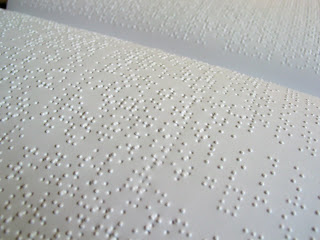I was incredibly fortunate this past week to have in my class at the Winter Intensive a music director who relies on Braille resources in her work. I must confess that until recently, it hadn’t occurred to me just how much we rely on the printed page and our eyes when we read music, teach, instruct, and conduct. I did my best to help this very patient student through the week, but I know there was much more I could have done.

How can we convey what we are trying to teach without the student being able to see the printed page, much less the board at the front of the room? I attempted to think about how I could rephrase questions in a way that would allow for details to be more easily visualized. When we were talking about the staff, the clefs, and some beginning Solfege, for example, instead of being able to look at a page in front of her, this student had to rely on what I was saying. Rather than merely asking what pitch we would be beginning on (which everyone else could look at and see), I would say something like…the do clef is on the top line. The first note is on the second line down. Now I am sure I didn’t do enough of this kind of thing…and anything I could even think of doing would fall short of adequately passing on the course material she had come for
Talking was good. Taking time to explain in breaks was good. Asking her to place her hand on mine while I was conducting was good. But it was not nearly enough.
As you can imagine, there are not a lot of resources out there when it comes to Gregorian Chant. I’ve gotten online and googled around, and I have come up with this book from a scholar working in the Netherlands. A quick scan through the book brings you up to date on the extreme challenges involved in transcribing Gregorian notation (not just square notes, but signs, etc.) into Braille. For anyone reading this post who wants to read the book in Braille, have a look at the preface. It includes an address to which you can write in order to obtain a Braille edition.
It frustrates me to think of how many wonderful musicians and faithful servants are out there working in schools and parishes, or would be working in schools and parishes, passing on their knowledge and love of the music of the Church, if more resources were available to make their job more satisfying.
By the end of the week, my student came up with what I think is a great idea…and I’m going to pursue it: puff paint! I’m going to print out a few pages of neumes; I guess I’ll start with the basic ones. I’ll enlarge them and do my best to trace over the neumes with puff paint. Will it work? I am also very lucky to have a schola member here at home who can tell me if what I come up with is helpful at all. Wish me a steady hand!





